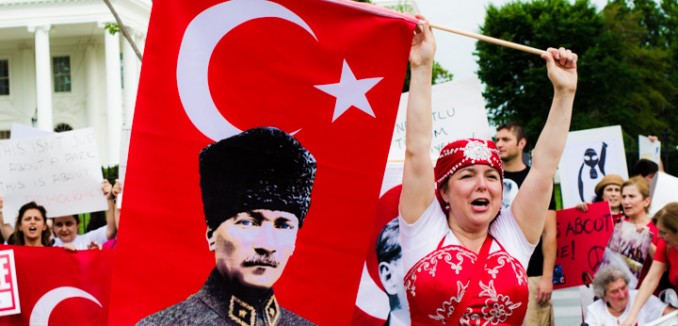The Turkish government and the administration of President Recep Tayyip Erdogan have been subject to harsh criticism in the past several days from various parties in the country, which stem from the passage of several controversial bills in the parliament and a tightening grip on the judiciary. Turkish commentators fear (Arabic link) that Erdogan will use the new powers against minorities and opposition figures in Turkey.
The ruling party – The Justice and Development Party (AKP) – introduced a bill last week that permits the arrest and confiscation of property of anyone who opposes the Islamic party that has controlled the country since 2002. The new bill also allows wiretapping of opposition activists, and may facilitate searches conducted by security forces in people’s homes.
Meanwhile, the government also submitted a bill that is supposed to provide the security forces additional powers in their measures against protesters. This bill is a direct result of the recent Kurdish protests against Erdogan’s foreign policy.
In a quick response (Arabic link), Turkish opposition figures accused Erdogan of “reviving the era of the coups”, during which strict laws were applied against civilians. Residents worry (Arabic link) that Turkey will become a “police state” if the laws are actually implemented.
In a third legal development, the Turkish Islamic government led by Erdogan also increased its control of the judiciary, which the recent elections have seen populated with a majority of AKP supporters. Many Turkish figures harshly condemned the move, arguing it represents a lack of separation of powers.
Meanwhile, massive Kurdish protests are taking place in Turkey against Erdogan’s delay in sending aid to the Kurds fighting the Islamic State of Iraq and Syria (ISIS) in the Syrian city Kobani. In recent days, Turkey has been described in the Middle Eastern media as a “turtle”, although it allowed some Kurdish forces to cross its border and help the Kurds in Kobani.
Curbs on social media and harassment of journalists this year have led to Turkey’s being designated “Not Free” by Freedom House, which monitors press freedom worldwide. Erdogan has also been struggling to keep a massive corruption scandal plaguing his government under wraps and hurt ties with NATO by seeking a missile defense deal with China. Turkey’s deepening ties with Iran this year were manifest in a deal that undermined economic sanctions against Iran raising questions about its reliability as an ally.
In Where the Shadiest Players Find a Home, which was published in the September 2014 issue of The Tower Magazine, Jonathan Schanzer took stock of Turkey’s mischief-making and concluded:
Unfortunately, it does not appear that Turkey will redress these problems any time soon. With Erdoğan’s ascent to presidency, and with his former foreign minister, Ahmet Davutoğlu, taking over as prime minister, the architects of Turkey’s dangerous foreign policies have consolidated power. This means that Turkey is more than likely to continue to drift from the Western orbit, and to resemble some of the more dangerous actors in the Middle East.
[Photo: Cool Revolution / Flickr]




